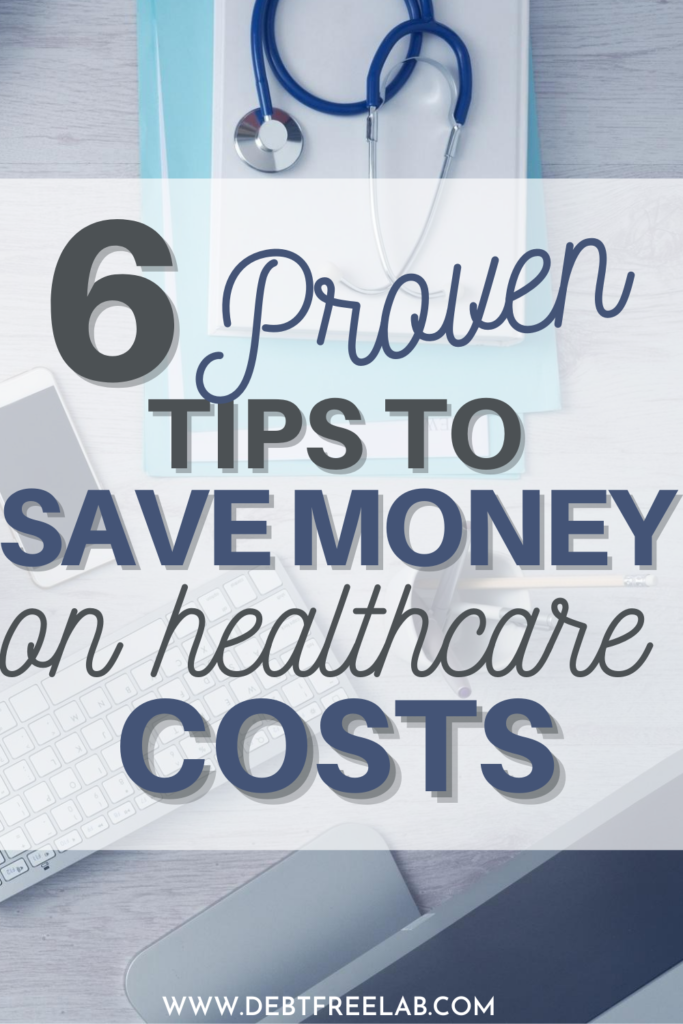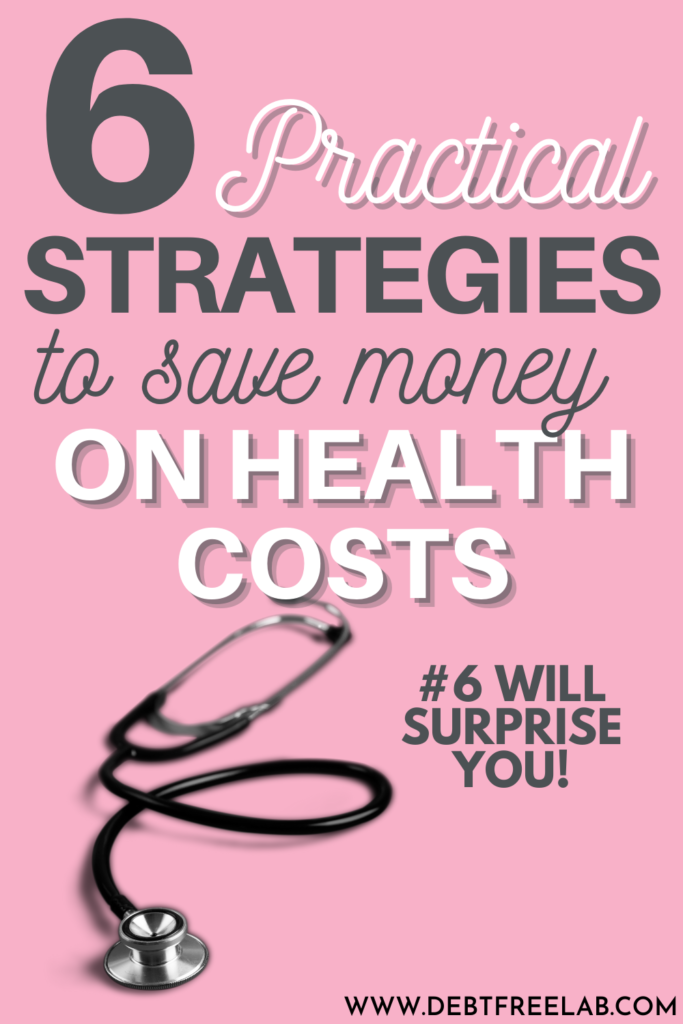
6 Practical Strategies to Save Money on Healthcare Costs
We tend to take healthcare costs for granted, but should we? Read on for some easy-to-implement tips to lower down those medical bills.
This post may contain affiliate links, which means I may earn a small commission at no extra cost to you. For more information, please see my disclosure here. Thank you for your support!
Many of us have come to think of healthcare costs as just a fact of life.
We go to the doctor, they charge us some amount, and we pay it, no questions asked.
However, there’s many healthcare costs that aren’t worth the money.
Here’s the top 6:
Going Without Health Insurance
It may sound logical for a young person in good health to skip getting health insurance.
However, emergencies and unanticipated illnesses can happen to anyone.
According to the Medical Expenditures Panel Survey, the average cost for an emergency room visit can be over $2,000 for the most common outpatient conditions treated in the ER.
However, the maximum charge can be much higher.
When you have insurance, the insurance company negotiates rates for each service you may receive from approved health care providers.
Additionally, plans normally have an out-of-pocket expense maximum.
In most cases, this means you’ll only be responsible for expenses adding up to that amount.
Without insurance however, you will be billed the full cost of the service you received.
According to the Medical Expenditures Panel, this can be over $24,000 for something as common as a sprain or strain, and over $73,000 for a urinary tract infection.
A bill that large can prove to be financially catastrophic.
Add lost wages to the mix, and it’s no surprise that high medical bills are responsible for over 60% of all bankruptcy filings.
A recent study also found that one of the causes that often contributes to a medical-related bankruptcy is a lapse in coverage.
This is why it’s important to maintain continuous health insurance coverage year-round.
Related Posts
4 Easy Ways to Save Money When Dining Out
Insomnia Can Derail Your Finances. Here’s How to Keep Them on Track
11 Smart Hacks to Slash Your Grocery Bill in Half
Heading Straight for the Emergency Room
As urgent cares become more common and accessible, those hospital bills can also be slashed by visiting an urgent care for non-life threatening emergencies instead of heading straight to the ER.
If your insurance policy carries co-payments, an urgent care visit will normally cost you around $50.
On the other hand, an emergency room visit may carry a co-payment between $100 and $250.
However, if you’re paying out of pocket, whether it’s because you don’t have insurance or because you still haven’t met your deductible for the current policy period, the savings can add up to $1,000 for a single visit according to health insurance company Medica.
An urgent care can solve most common issues such as respiratory infections, earaches, and dislocations, as well as perform testing and imaging services.
When should you absolutely go to the emergency room instead?
If you have any life-threatening symptoms, acute chest or abdominal pain, or signs of a stroke, skip the urgent care.
In other cases, the decision depends on what your local urgent care can handle.
When my son recently broke his ankle, the local urgent care informed me they could treat sprains, but not broken bones as they don’t do casts.
I had to take him to the ER for treatment.
Be sure to call ahead of time to ask about their services and keep in mind that urgent cares don’t normally operate 24 hours a day like a hospital does.
Not Taking Advantage of Preventive Services
Most insurance plans offer preventive services that are covered at 100%.
From well-child yearly visits to preventive testing, these services are completely free to the patient.
They can effectively prevent and detect any issues early on, which can also save money on medical procedures down the road.
Speaking of prevention, an easy way to save on healthcare costs is to avoid them int he first place.
Be sure to take any necessary vitamins, eat well, exercise regularly and get enough sleep!
Here’s a couple of my favorite apps to help me sleep better:
Calm
The Calm app comes with a host of features. It includes relaxing music to help you relax and sleep restfully, and guided meditation tracks among many more (also available for android here).
You can try the Calm app free for 7 days – you’ll fall in love with it!
Rise
Rise tracks your sleep and then analyzes your data using sleep science to help you become a better sleeper.
The best part is that it does it right from your phone – no other gadgets required! You can download it for free for iOS or Android.
Another way to take preventive steps to stay physically healthy is to take care of your mental health.
Whether it’s taking a short walk or meditating, take some time each day to de-stress and practice some self-care.
One of my favorite things to do to sort of “re-center” myself is to write in a gratitude journal.
This helps me shift my focus towards a positive outlook and does wonders to lower my stress levels.
Want to try one for yourself? Get yours here:

Ignoring Your Benefit Schedule
Prior to visiting your doctor’s office, review your benefits schedule.
By becoming familiar with what your plan covers, you can avoid unexpected expenses later.
Additionally, prior to paying any invoices, be sure to know what you’re paying for.
Request a breakdown of the charges and review them against your benefit schedule.
To reduce any pressure to not hold up the line, step away from the check-out counter while you review the charges.
If you have any questions, take some time to discuss them with your insurance company.
Going Out of Network

Not all doctors are created equal.
When it comes to medical charges, there could be a large difference between one doctor and the next.
Prior to your next visit, call around several doctors in your area and ask what the cost range is for the services you anticipate needing.
If you’re looking for a doctor through your insurance’s provider directory, look for information on the average or estimated cost for that doctor and whether or not they’re in line with other doctors in the area.
Additionally, when choosing a hospital or urgent care, be sure to stick to an in-network provider.
According to HealthCoverageGuide.org, going to an in-network provider instead of venturing out of network could save you almost $11,000 on a $22,000 bill.
Paying for Brand Name Prescriptions
Before you head out of the doctor’s office, if you got a prescription, ask if the medicine is available in a generic version.
Generic medicines are just as effective as brand-name ones for just a fraction of the cost in most situations.
Just be sure to ask about drug interactions and whether or not it’s safe to switch.
Taking Your Medical Bills for Granted
Not negotiating your medical bills can be costly.
When faced with a large medical bill, contact the hospital or doctor’s office billing department and negotiate a discount.
Don’t give up if they say no the first time.
Request to speak to a manager if necessary (Did I mention my name is Karen?)
If they’re not willing to make any concessions, request for a payment arrangement that can fit into your budget so the bill doesn’t derail your finances.
Want some tips on how to create an effective budget? Get our Quick Start Guide to Successful Budgeting today!
Final Thoughts
Healthcare costs can get astronomical for just one hospital visit.
However, by following these guidelines you can save some serious cash.
One word of caution though, preventing a problem is always better – and cheaper – than trying to cure it later on.
I have made the mistake several times of postponing going to the doctor or a hospital because of how expensive it can be, only to end up paying for a more complicated test or procedure later on.
When it comes to prioritizing, you can’t put a price on your health.
What other tips have helped you save on healthcare costs? Share them with us below!



